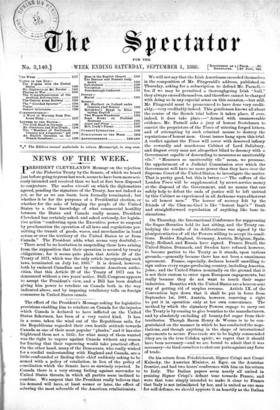On Thursday, the International Conference for suppressing the Sugar-Bounties held
its last sitting, and the Treaty em- bodying the results of its deliberations was signed by the plenipotentiaries of all the Powers willing to accept its condi- tions. Besides England, Germany, Austria, Belgium, Spain, Italy, Holland, and Russia have signed. France, Brazil, the United States, Denmark, and Sweden have refused, however, to become parties to the Treaty as it stands, upon various grounds,—generally because there has not been a unanimous agreement. France, especially, declares herself unwilling to sign unless every sugar-producing country, including America, joins; and the United States nominally on the ground that it is not their custom to enter upon European engagements, but really because they do not want to touch their sugar industries. Bounties with the United States are a heaven-sent way of getting rid of surplus revenue. Article IX. of the Convention lays down that it shall be put in force from September 1st, 1891, Austria, however, reserving a right to put it in operation only at her own convenience. The method by which the signatory Powers engage to carry out the Treaty is by ceasing to give bounties to the manufacturers, and by absolutely excluding all bounty-fed sugar from their territories. Though Baron Henry de Worms is to be con- gratulated on the manner in which he has conducted the nego- tiations, and though anything in the shape of international agreements to secure Free-trade are to be highly commended (they are in the true Cobden spirit), we regret that it should have been necessary—and we are bound to admit that it was necessary—to bind ourselves to shut our ports against any form of trade.


































